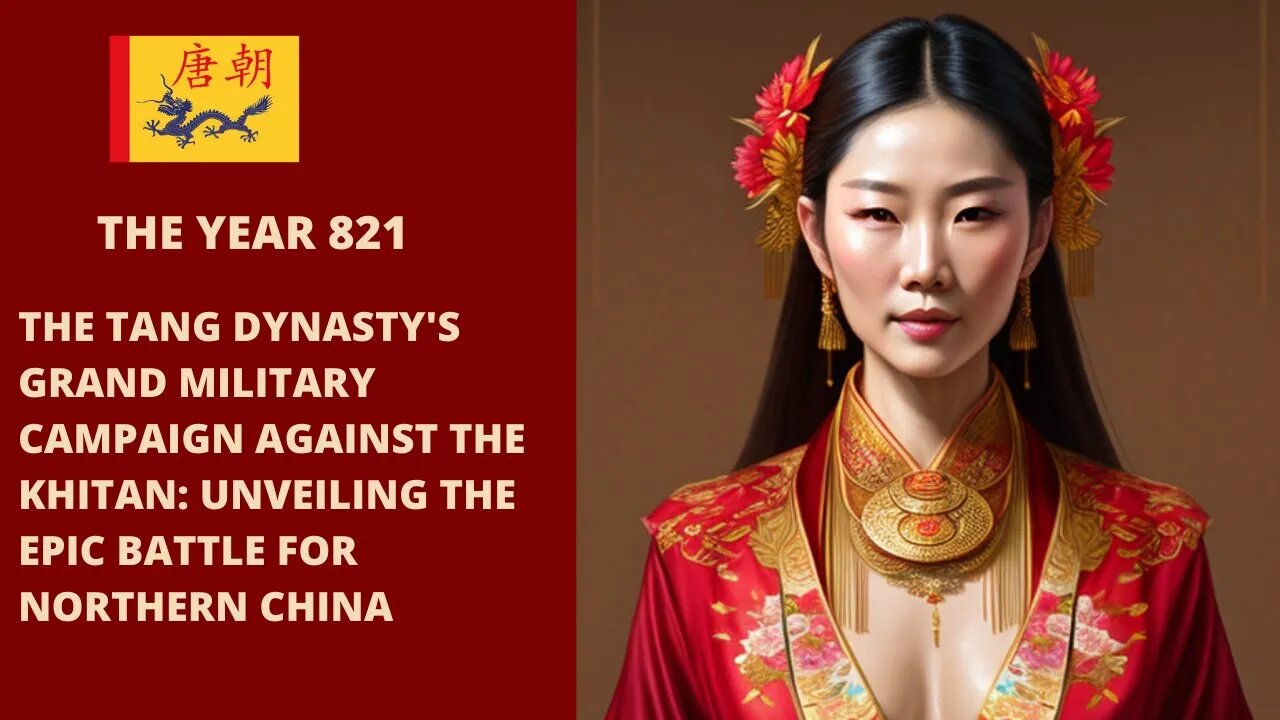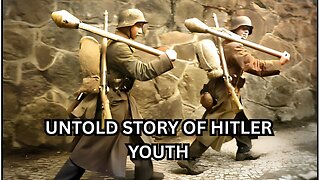Premium Only Content

Uncovering the Tang-Khitan War: The Epic Battle for Northern China
#Past, #Heritage, #Tradition, #Ancestry, #Legacy, #Culture, #Civilization, #Chronicle, #Timeless, #Antiquity, #Annals, #Memorabilia, #Remembrance, #Yesterday, #Retrospect, #Nostalgia, #Archeology, #Historic, #Historicity, #Mythology, #Folklore, #Historiography, #Paleontology, #Epitaphs, #Lineage, #Roots, #Genealogy, #Museums, #Monuments#TangKhitanWar #NorthernChina #ChineseHistory #EpicBattle #AncientBattles #MilitaryHistory #HistoricalFacts #Documentary #Warfare #EmpireBuilding #Dynasties #WarTactics #Strategy #MedievalBattles #ArmedConflict #TangDynasty #KhitanEmpire #HistoryChannel #LearningHistory #scholarship
Uncovering the Tang-Khitan War: The Epic Battle for Northern China
Join us as we delve into the epic battle for Northern China and uncover the Tang-Khitan War! The Tang Dynasty's Grand Military Campaign against the Khitan is an awe-inspiring story of bravery, strategy, and sacrifice. In this video, we reveal crucial details about this crucial war and explore the significance of this historical event. We examine the key players, including the Tang Dynasty's renowned general Li Keyong and the Khitan's formidable military leader Yelu Abaoji, and analyze their tactics and maneuvers. We also take a deep dive into the legacy of this conflict and its impact on the region's history. If you're interested in history, military strategy, or ancient civilizations, you won't want to miss this exciting exploration of the Tang-Khitan War.
History is a broad term that refers to the study and interpretation of past events and their significance to the present day. It encompasses the actions, beliefs, and experiences of human beings throughout time, as well as the physical artifacts and records that document these events. The study of history helps us to understand how the world we live in today has been shaped by past events and how we can learn from them.
The importance of history cannot be overstated. By examining past events, we can learn from the successes and failures of those who came before us, and apply this knowledge to our own lives and society. It helps us to understand the roots of current political, economic, social, and cultural issues and how they have evolved over time. History can also help us to appreciate the diversity of human experience and the many ways in which people have interacted with one another throughout history.
One of the key methods used in the study of history is the interpretation of primary sources. These can include written records, such as letters, diaries, and official documents, as well as physical artifacts like artwork, tools, and architecture. By examining these sources and analyzing them in context, historians can gain insights into the beliefs, values, and motivations of past peoples and societies. This can help us to understand the complexities of human behavior and decision-making, as well as the impact of larger social, economic, and political forces.
Another important aspect of the study of history is the consideration of multiple perspectives. This involves taking into account the viewpoints of different groups of people, such as women, minorities, and those who have been historically marginalized or excluded from mainstream narratives. By doing so, historians can gain a more complete picture of past events and the ways in which they have affected different communities.
In addition to its academic importance, history also plays a crucial role in shaping our collective memory and identity as a society. By remembering and commemorating important events and figures from the past, we can create a shared sense of history and belonging. This can help us to build stronger communities and foster greater empathy and understanding between different groups of people.
Overall, the study of history is essential for understanding ourselves, our world, and our place in it. Through careful analysis of past events and sources, we can gain insights into the complexities of human behavior and decision-making, appreciate the diversity of human experience, and learn from the successes and failures of those who came before us.
-
 14:05
14:05
A Small Part of History
3 months ago $0.01 earnedThe Untold Story of Hitler Youth in Battle
55 -
 1:36:19
1:36:19
Flyover Conservatives
15 hours agoOnly 17% of Millennials Hit These 5 Adult Milestones—Why?; What If Childhood Trauma Is Behind Your Health Problems? - Dr. Troy Spurrill | FOC Show
32.6K4 -
 4:49:04
4:49:04
HogansAlleyHero
17 hours ago💥CHASING DOPAMINE💥✅TRUMP SAYS BATTLEFIELD IS THE BEST✅
41.8K3 -
 1:57:40
1:57:40
MattMorseTV
7 hours ago $10.90 earned🔴Trump just SHATTERED the PROJECTIONS.🔴
54.3K50 -
 2:32:19
2:32:19
megimu32
6 hours agoOTS: From Star Search to Superstardom
38.7K4 -
 1:56:21
1:56:21
Joker Effect
5 hours agoInterviewing GREENMAN! Looks like he is coming to Rumble! Let's give him a warm welcome! REAL TALENT
23.7K1 -
 1:07:21
1:07:21
Anthony Rogers
12 hours agoEpisode 380 - Is Pain All In Your Head?
16.6K3 -
 1:46:17
1:46:17
Glenn Greenwald
10 hours agoGlenn Takes Your Questions on Censorship, Epstein, and More; DNC Rejects Embargo of Weapons to Israel with Journalist Dave Weigel | SYSTEM UPDATE #505
118K8 -
 3:26:34
3:26:34
Jokeuhl Gaming and Chat
11 hours agoHelldivers 2 - Spreading Democracy w/ Ryker
13.2K1 -
 27:47
27:47
Stephen Gardner
6 hours ago🚨BREAKING: Trump FURIOUS Over Kamala’s Latest Move – SHOCKING Details!
18.7K82